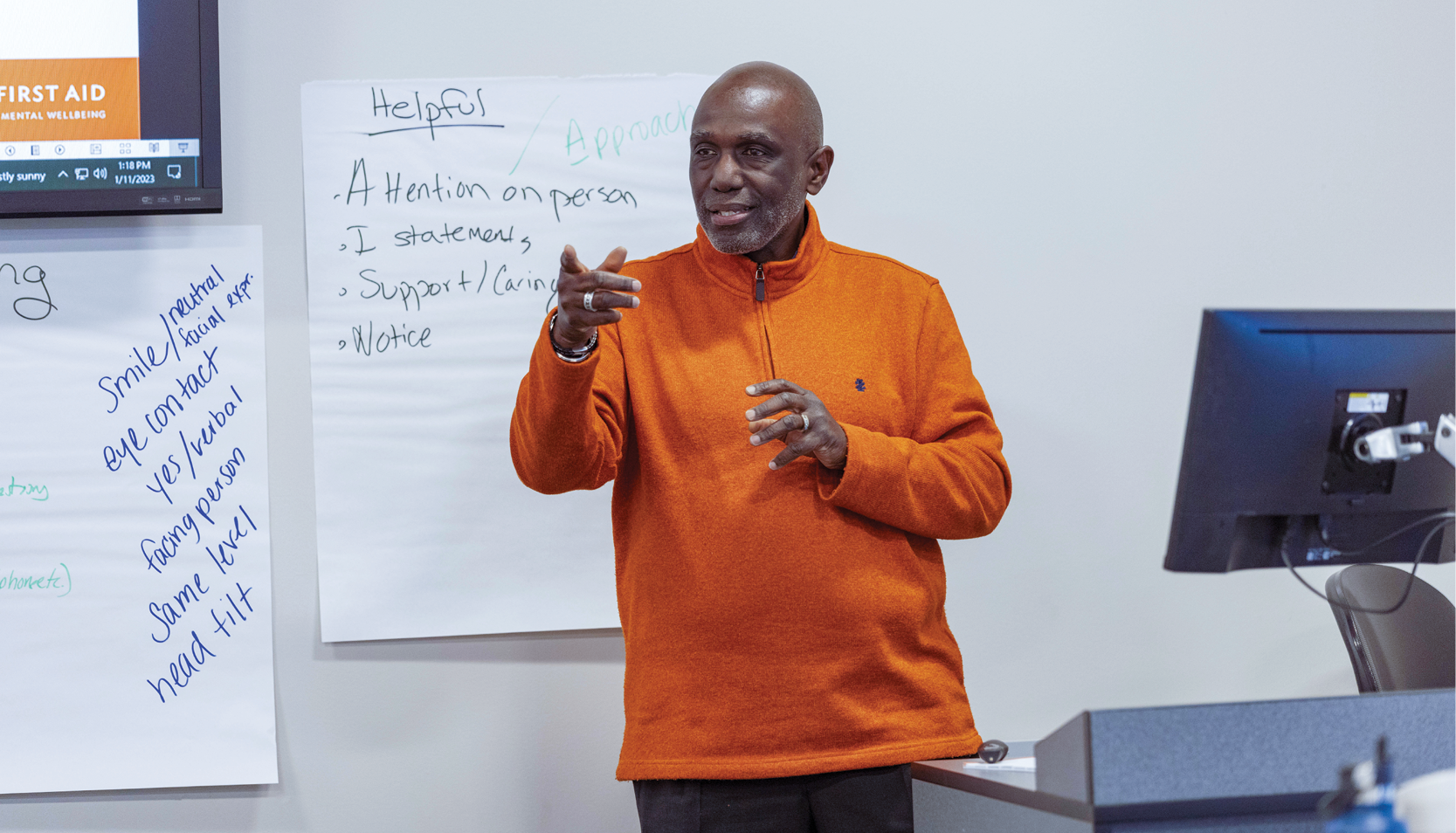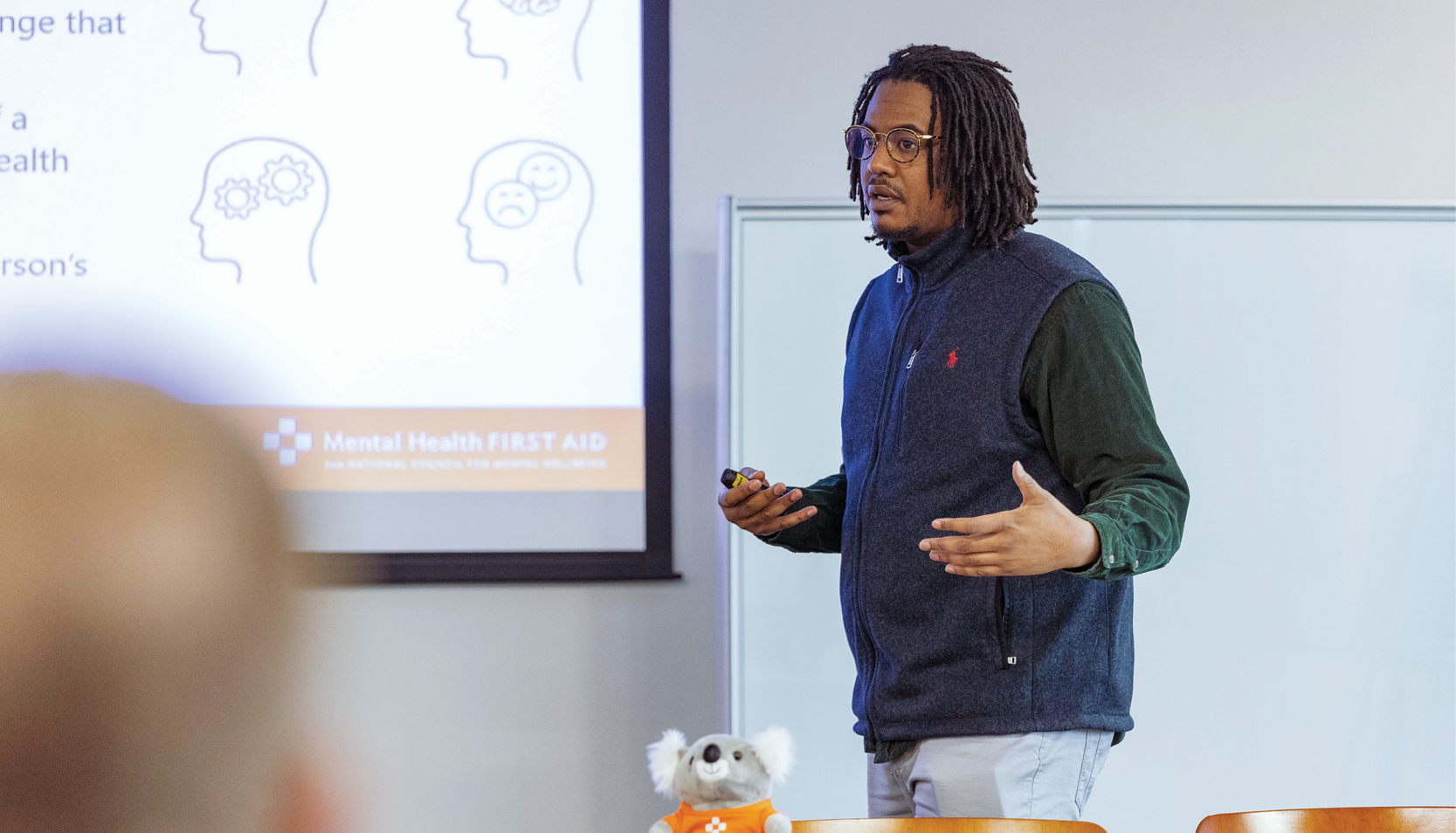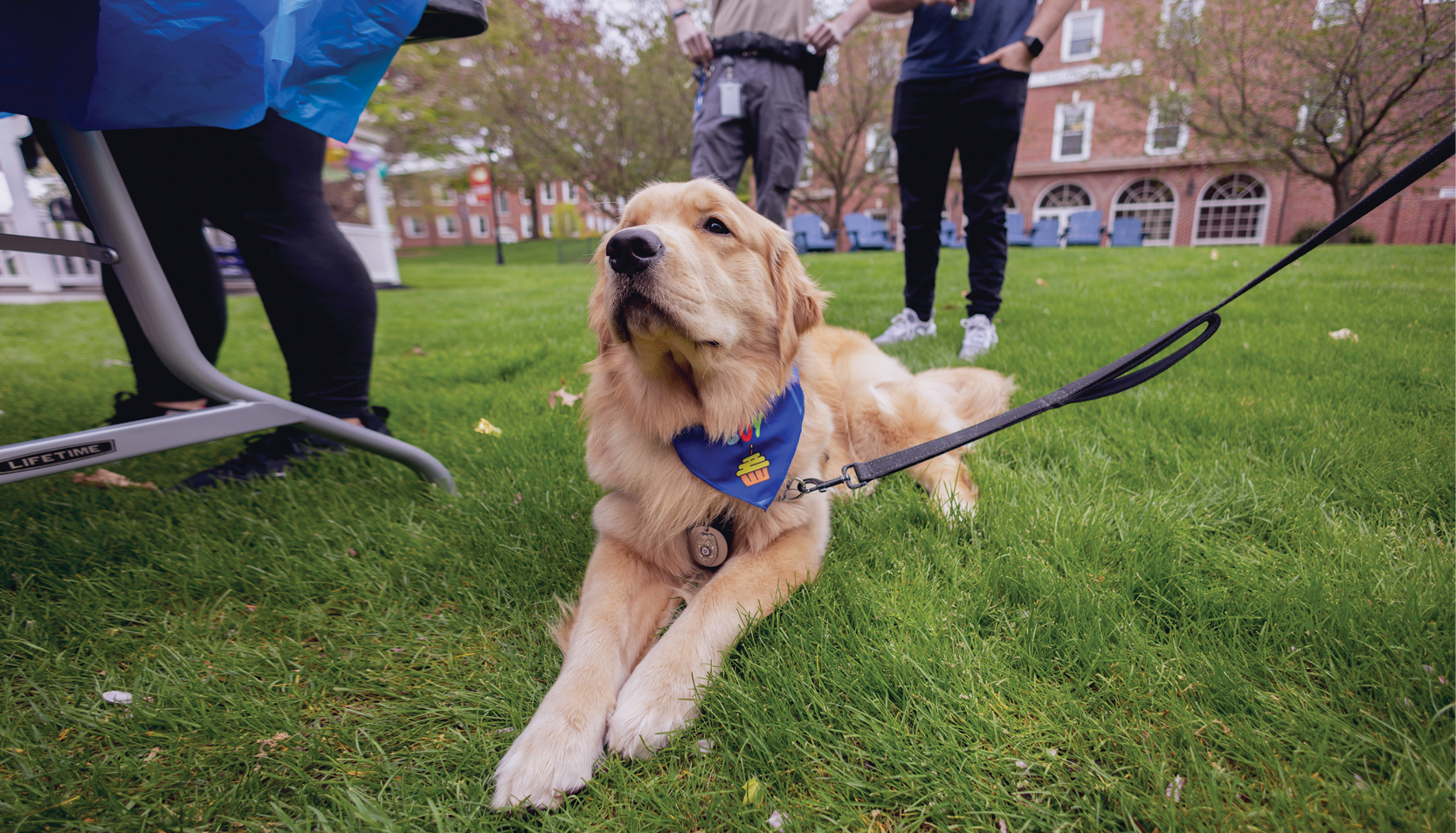
Promoting a Culture of Care
Faculty and Staff Engage in Mental Health Training
By Alex Lyman ’12/G’16
What would you do if you saw someone having a mental health crisis right in front of you? Could you help them?
That’s what the Mental Health First Aid (MHFA) program at Western New England University is trying to do—equip people with the skills and training to provide initial help to someone experiencing a mental health crisis or substance abuse problem. MHFA allows certified individuals to identify, understand, and respond to someone going through a crisis. Proponents of the movement aspire for MHFA to be as normalized as basic first aid. The same way you might automatically give someone CPR when they aren’t breathing or use the Heimlich maneuver on a choking person, you would also know to provide MHFA to someone in crisis.
Answering the Call for Aid
MHFA began at WNE in 2019 when Clinical Professor of Community Care, Dr. Kam Capoccia became the first employee to complete training. In 2020, Capoccia became an instructor as a way to help her students manage their mental health.
“My ‘why’ started in the classroom with our pharmacy students,” said Capoccia. “I teach a particular lesson about how to assess patients and how to screen for depression. During that week in class, I encourage them to reach out if they need support. Over the last several years, more and more students have been asking for help with their mental health challenges. So, when the Mental Health First Aid certification came about, I immediately signed up and became a mental health first aid provider.”
In subsequent years, more than 300 students, faculty, and staff have been certified as mental health first aiders. However, the need to support students and the campus community and their mental well-being has only grown in importance since the onset of the COVID-19 pandemic. According to the Kaiser Family Foundation, 50 percent of young adults (ages 18–24) reported anxiety and depression symptoms in 2023, making them more likely than older adults to experience mental health symptoms.
Having seen the value of MHFA firsthand, Capoccia teamed up with Vice President for Student Affairs Kristine Goodwin, and a movement was born to not only support MHFA training and certification on campus, but also educate their own coalition of trainers.

WNE’s flagship MHFA program seeks to be a sustainable initiative that will cultivate and certify MHFA trainers, who, in turn, will run their own MHFA courses and train community members. This multiplying effect will offer more access to help for those in distress while reducing negative attitudes about mental illness and substance abuse.
“The program takes the fear and hesitation out of starting conversations about mental health and substance-use problems by improving understanding and providing an action plan that teaches people to safely and responsibly identify and help someone,” said Vice President Goodwin. “When more people are equipped with the tools to start a dialogue, more people can get the help they need.”

In January 2023, thanks to funding from the Office of the President, 15 faculty and staff members, including President Robert E. Johnson, were certified as instructors to teach MHFA to the campus community.
“Mental health and access to mental health assistance has always been of utmost importance on college campuses, but the pandemic heightened the need. I am a proud mental health first aid trainer, and my immediate involvement demonstrates WNE’s dedication to providing adequate resources on campus,” said President Johnson. “We must all work together to destigmatize mental health by having conversations, listening to what the campus community needs, and ensuring that we have the tools in place to meet the challenge.”
Creating a Culture of Mental Health Care on Campus
Now that MHFA instructors are in place, their mission is to conduct at least three certification programs each year, with the overall goal of having 35–50 percent of the campus community certified in mental health first aid in the coming years.
This target number isn’t arbitrary; in fact, studies suggest that a community needs a minimum of 25 percent of its population to be committed to a cultural shift for it to be successful. A new study from the University of Pennsylvania suggests that if at least 25 percent of a community’s population is committed to changing what is considered the social norm, the group will see a shift, with the majority adopting the new behavioral norm introduced by the minority.
The MHFA program plans for this shift to have both immediate and far-reaching effects, from benefitting wellness on campus now to expanding its reach to the greater Springfield community and empowering the average person to help those in distress.
“Western New England is embracing the mental health of our community, whether that be faculty, staff, students, parents, or our local collaborators. Instructing our mental health first aid trainers and getting our community mental-health-first-aid certified has already had such an amazing impact. I am proud we are leading this front in the Springfield community and providing support and awareness,” added Capoccia.
“We must all work together to destigmatize mental health by having conversations, listening to what the campus community needs, and ensuring that we have the tools in place to meet the challenge.” - President Robert E. Johnson
Individuals who support the concept of MHFA but feel daunted by the idea of assisting someone in crisis should know that training as a mental health first aid provider will give them the capability to help. However, they are not expected to exceed their training.
“One of the biggest things we learned in training is that mental health first aiders notice, but we don’t diagnose,” explained Associate Dean for Law Student Affairs Jordan Hall, who is an inaugural MHFA instructor. “Although we’re able to recognize signs and symptoms, we’re not necessarily attributing the symptoms to a specific disorder because we’re not doctors, we’re not psychologists, and we’re not therapists. However, being able to use language that doesn’t perpetuate harm and directing someone to resources is invaluable.

“Mental health is important to any person and profession, regardless of what you’re doing or who you are. It is, by far, one of the main reasons that we succeed or do not succeed. Being able to recognize when someone is suffering or going through challenges is essential to a positive outcome.”
Campus Initiatives Introduce Expanded Counseling and a Canine Companion
Mental Health First Aid certification is only one step in WNE’s comprehensive plan to make the health and wellness of community members the highest priority.
From the newly-expanded Center for Health and Wellness, which has absorbed counseling into its folds and widened its scope, to the 24/7 Mental Health Urgent Care Line, which connects students in crisis to an on-call counselor, services are continuing to expand to meet the needs of Golden Bears.
Among the most popular of the new initiatives is a 1-year-old furry four-legged friend who has paws on the ground in the pursuit of support.

Bear the Comfort Dog joined the WNE Department of Public Safety in July 2022 and serves as the University’s first comfort dog, working alongside his handler, Sergeant Alexandria Capen-Parizo.
Typically, comfort dogs are available during police investigations to reduce anxiety and increase witness or victim communication with investigators. They also provide comfort to people in times of crisis, tragedy, or traumatic events. However, Bear’s role on campus tends to focus on supporting campus safety efforts and helping to encourage a safe and comfortable environment at WNE—often through a game of fetch between classes or cuddles in the University Commons.
Bear has already proven to be a valuable asset to the WNE Police Department by fostering dialogue and communication between the department and the community. He has become a much-loved presence at WNE and makes appearances at community events and around campus to provide fun and stress relief for our students, faculty, and staff.
Much like the community he serves, Bear is furthering his education to ultimately become a certified therapy dog, which he hopes to accomplish by the time he is 2 years old in May 2024. He lives with Sergeant Capen-Parizo and her partner and his canine brother, Ragnar.


